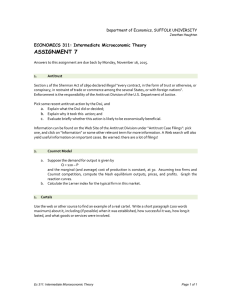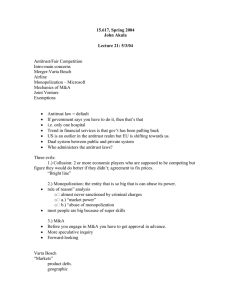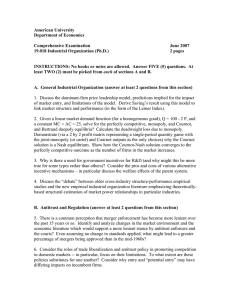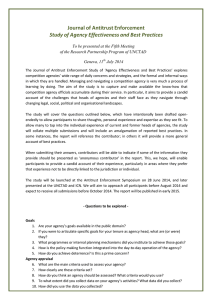TITLE: ANTITRUST LAWS POLICY NO: P-030 SUBMITTED BY: C. CONNER
advertisement
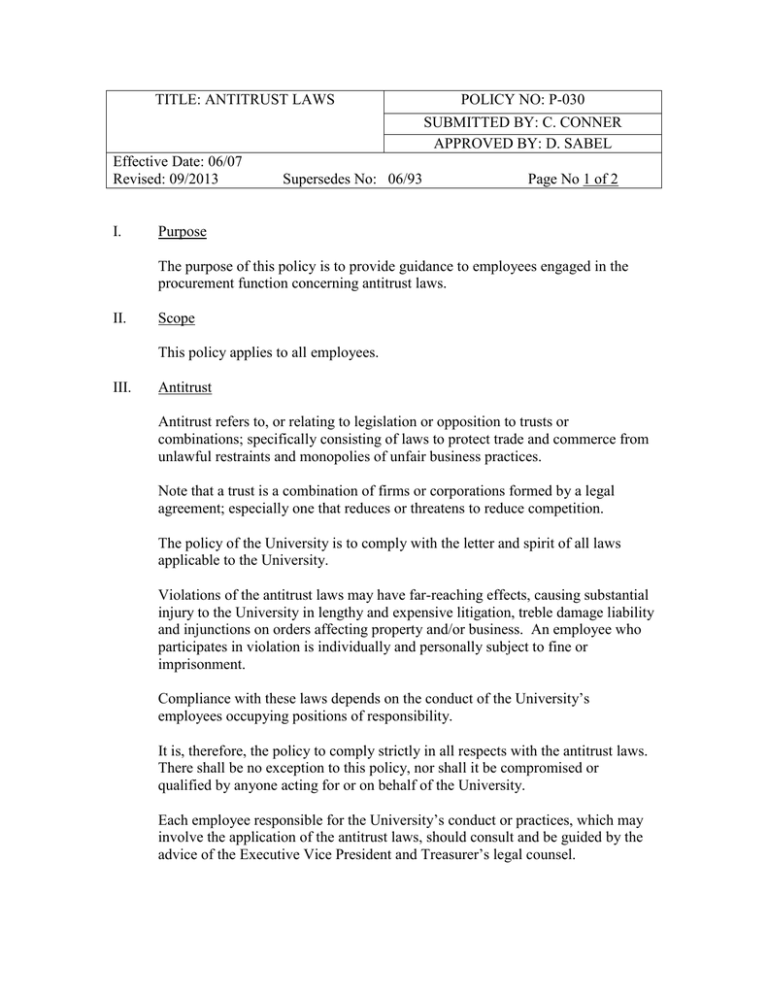
TITLE: ANTITRUST LAWS POLICY NO: P-030 SUBMITTED BY: C. CONNER APPROVED BY: D. SABEL Effective Date: 06/07 Revised: 09/2013 I. Supersedes No: 06/93 Page No 1 of 2 Purpose The purpose of this policy is to provide guidance to employees engaged in the procurement function concerning antitrust laws. II. Scope This policy applies to all employees. III. Antitrust Antitrust refers to, or relating to legislation or opposition to trusts or combinations; specifically consisting of laws to protect trade and commerce from unlawful restraints and monopolies of unfair business practices. Note that a trust is a combination of firms or corporations formed by a legal agreement; especially one that reduces or threatens to reduce competition. The policy of the University is to comply with the letter and spirit of all laws applicable to the University. Violations of the antitrust laws may have far-reaching effects, causing substantial injury to the University in lengthy and expensive litigation, treble damage liability and injunctions on orders affecting property and/or business. An employee who participates in violation is individually and personally subject to fine or imprisonment. Compliance with these laws depends on the conduct of the University’s employees occupying positions of responsibility. It is, therefore, the policy to comply strictly in all respects with the antitrust laws. There shall be no exception to this policy, nor shall it be compromised or qualified by anyone acting for or on behalf of the University. Each employee responsible for the University’s conduct or practices, which may involve the application of the antitrust laws, should consult and be guided by the advice of the Executive Vice President and Treasurer’s legal counsel. TITLE: ANTITRUST LAWS POLICY NO: P-030 SUBMITTED BY: C. CONNER APPROVED BY: D. SABEL Effective Date: 06/07 Revised: 09/2013 Supersedes No: 06/93 Page No 2 of 2 Should an employee acting in good faith for the University, nevertheless become involved in an antitrust proceeding, the University will be prepared to assist the employee to the extent possible, including retention of counsel for defense in the case. Each employee is obligated to adhere to the above policy. The procurement employee is not expected to have the knowledge of a lawyer, but is expected to be guided by past practices and policies and by common sense. When faced with a new problem with unknown legal implications, the Procurement Professional is expected to refer to his/her supervisor for advice and handling. IV. Robinson Patman Act It is also policy to purchase goods and services on the basis of price, quality, terms, and services. Personnel performing a procurement function shall not demand or negotiate a special pricing structure from a supplier that the supplier is not willing to offer to other customers under similar conditions and terms. The legal counsel, through the Director of Procurement Services, should be consulted prior to taking action when in doubt about application of this policy to any activity. REFERENCES: PURCHASING HANDBOOK By GEORGE ALJIAN 4TH ED, 1981, MCGRAW-HILL BOOK CO ISBN-0-07-045899-5 SHERMAN ANTITRUST ACT, CH 4, PG 25 ROBINSON PATMAN ACT, CH 3, PG 10 CH 10, PG 11 CH 11, PG 22 CLAYTON ACT, CH 11, PG 11 THE LAW OF PURCHASING EDITOR, WILLIAM A. HANCOCK BUSINESS LAWS INC., 1981, REVISIONS TO 1/93 ANTITRUST LAWS, CH 16, PP 1-43
